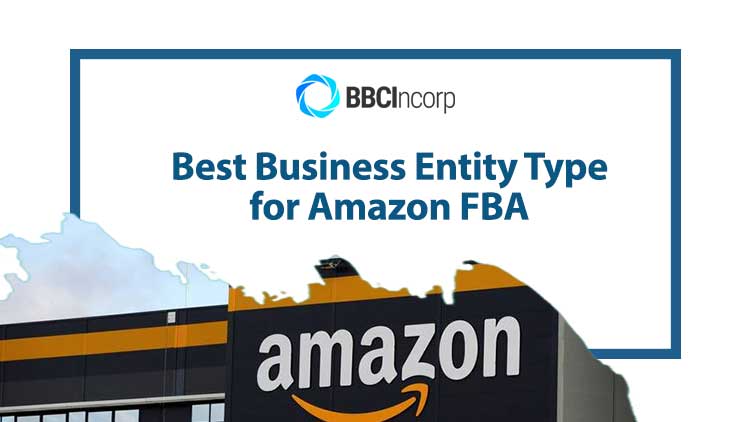
When you decide to open an online business with Amazon FBA, many of you choose to begin with a sole proprietorship. It is mainly for cost minimization and simple formation process. But when your business grows bigger, this structure is no longer a safe option for you.
The question then arises, “Which is the best business entity type for Amazon FBA?’’
This article will cover a breakdown of the most popular legal entities and their key features. And you may find the one that best suits your business needs.
1. Key considerations for choosing the best business structure for Amazon FBA

As a new eCommerce player on the Amazon market, you are probably overwhelmed by many decisions to make. One of such decisions is to determine the best structure for your Amazon FBA business.
You can just go straight to the Amazon site and register as a seller. Then you use the Amazon FBA program to ship your products to your customers.
However, you must know product liability is one of the major risks when it comes to operating an online business. You expect your business to grow bigger, but it will increase the chance of getting in legal troubles. This is why you need a legal entity to protect yourself and your business from potential creditors and claimants.
Additionally, you must know that you can’t sell on Amazon if your country is out of the list of countries accepted for Amazon seller registration. But don’t worry! Your business still has an opportunity to grow on the Amazon platform if it is a legal entity.
Choosing the right entity for your business from the start will save your time and money. It helps to build a solid business empire for the smooth running of your Amazon FBA business.
Then, you must be wondering which is the right business entity for your business. Consider the following factors to get the answer:
1.1. Level of ownership involvement
Before deciding the entity type, you must determine how you will get involved in the Amazon business management. You must clarify that whether you want to:
- Start the business with other members;
- Don’t want to get involved in daily business operations; or
- Be wholly responsible for the management.
After the determination, choose the one that matches your purpose.
1.2. Protected liability
As an Amazon seller, you have a possibility to get complained or sued by your customers. This will mainly happen when your products are shipped to the buyers with damages or by faults.
In this situation, a business entity that has a separate personality from the owner will protect your personal assets. It also helps to minimize your liabilities for the business as the owner.
1.3. Registration process
A more complicated entity such as a corporation requires more procedures for the registration. Many entrepreneurs picked an LLC to structure their business for its simple and fast incorporation process.

1.4. Fees and obligations
Depending on how you aim your Amazon business to grow in the future, an appropriate structure will minimize the business costs.
For a company incorporation, there are some obligated fees you must submit to the government. Such fees can be for registering the business, obtaining a registered agent, filing annual reports and taxes, or annual maintenance.
The obligations and their payable amount will vary depending on the entity type of your business. For instance, a Delaware LLC doesn’t need to file annual reports but must pay an annual fee of $US 300 to the Secretary of the state.
1.5. Taxation
Paying tax is a thorny issue for most Amazon sellers, especially for beginners. If you choose the wrong entity for your business, it may suffer a higher tax burden than it is supposed to pay.
Assume that your Amazon business just starts to make significant income. Your business will pay a much higher amount of tax on the profits if its legal entity is required to report the income under a corporate tax rate. It is because the corporate rate is almost double the personal income tax rate. In this case, choosing an entity in which the company tax is passed through the owner’s income tax will benefit your Amazon business.
2. Best Business Entity Types For Amazon FBA
Choosing the best structure for your Amazon FBA business seems to be an easy decision. But you must think carefully beforehand because it will significantly affect the business in the long run.
Take a look at the following entity types to see which one will be your best choice.
2.1. Limited Liability Company (LLC)

Forming an LLC for Amazon FBA is one popular decision for many entrepreneurs on Amazon.
Let’s see why the business owners prefer an LLC.
LLC has a simple but flexible structure. Owners and managers are responsible for managing the company. You can form this business entity with one or more members.
While the downside of a sole proprietorship is the unlimited personal liability, an LLC provides the owners with limited liability. You won’t be liable for any debts and obligations of the business. When your Amazon business gets sued, only the business assets are at risk, your personal asset will be protected.
Your Amazon business also enjoys tax advantage if it is incorporated as an LLC. This is because the entity has a pass-through feature like a sole proprietorship. The business income will be taxed as your personal income. Besides, an LLC may be eligible to receive a Qualified Business Income Deduction of up to 20% according to the Internal Revenue Service (IRS).
A plus point is that you can elect to have your LLC taxed as a corporation. With this flexibility, an LLC can fit in different particular business situations.
If you want an entity that is easy to form, has minimal business costs but still protects you from personal liability for the business, an LLC is the perfect fit.
Disadvantages
One disadvantage of LLC is that it isn’t a favorable structure to venture capitalists compared to a corporation. Which makes it more difficult to raise funds for your business from outside investors. Nevertheless, as a beginner in the Amazon market, this is the least concerning factor.
note
In some cases, a single-member LLC as a “disregarded entity” if it is not elected to be treated as a corporation for tax purposes. This means you are still subject to Self-employment Tax Requirements to the IRS like a sole proprietorship.
2.2. C Corporation

C corporation is one of the most common types in the company register. But it accounts for the less proportion of company formation for Amazon FBA compared to LLC.
C corporation has a separate entity from the owners. It also has the most complicated structure. The entity is owned and controlled by shareholders. Top three tiers of the company are shareholders, managers and directors.
Like an LLC, the corporation is responsible for debts and obligations itself. As a shareholder, your liabilities are limited to your own creditors and claimants.
The tax structure of a C-corporation is different from other business entity types. You have to submit the business taxes for the company profits, not your personal income like an LLC.
The registration process of a C corporation is more lengthy. There are more required procedures and documents compared to an LLC. Because of the complex business structure, it is required to meet more reporting and maintenance compliance requirements.
If you are just starting your small Amazon business, a C corporation is a bit too much for your circumstance. But if you want to get more capital funding to grow your business or fulfill your Amazon inventory, a corporation is the right choice.
2.3. S Corporation
S corporation is a type of corporation that meets the Internal Revenue Code requirements. The business entity has distinct characteristics.
Like a C-corporation, an S-corporation is structured by the ownership of shareholders. But it is only limited to 100 shareholders and only 1 class of stock while there is no limit for a C corporation. The entity also has a separate personality from owners, so the personal assets are protected from the business’s creditors.
The special feature of an S corporation is that it has the pass-through tax status like an LLC. All profits and losses of the business will be taxed as personal income. If you are a shareholder of the corporation, the revenue generated by the company will be counted as your individual income. Besides, this business entity may also receive a deduction on the qualified business income.
An S corporation can be registered from an existing LLC or C corporation. If you want to raise funds for your Amazon business and also enjoy the pass-through tax feature, an S-corporation is the ideal choice.
2.4. Sole proprietorship, or sole trader
Sole proprietorship is an unincorporated entity and the simplest type of an Amazon business structure.
You are the only member of the business. And there is no separation of legal personality between you and your business.
Many sellers started the Amazon business as a sole proprietor mainly because:
- There is no need to file the registration with the government;
- All generated profits and losses of the business will be yours; and
- Income tax filing for a sole proprietorship is simplified compared to some other entities.
When you register as a seller and list your first product for selling on Amazon, sole proprietorship will be your default entity. A sole trader may also enjoy the Qualified Business Income Deduction policy.

Flip side of a sole proprietorship
In some certain cases, your tax may be heavier under a sole proprietorship if your business makes a huge income. At federal level, the US charges 37% of individual income for tax collection with income over $US 539,900. Nonetheless, the flat rate of corporate income tax is only 21%.
In addition, as a sole proprietor, you will be liable for all potential debts and liabilities of your Amazon business. This is a consequence of no distinction between the business and the owner.
Selling on Amazon under a sole proprietorship would be problematic if you sell high-risk products. These products can involve safety and health risks such as medical products, food and beverages, supplements, cosmetics. Your Amazon business will get sued when the products cause damages to the consumers physically or mentally. As a result, your personal assets will be handed over to the claimants if your business loses in the lawsuit.
As a sole proprietor, you must submit a Self-employment tax of 15.3% to the government.
If you just want to test your products on the Amazon marketplace, or just sell items for your hobby, go ahead with sole proprietorship. But if you want to build your brand, grow your business on Amazon, do think about a structure that has separate entity like LLC or corporation.
2.5. Partnership
Some Amazon sellers choose to incorporate as a partnership. This business entity is classified into two different structures. You can form a general partnership or limited partnership.
General partnership
A general partnership has the same features as a sole proprietorship. But this entity has other members entering into the business with you and acting as the owners.
For example, you are selling makeup products on Amazon and your friend is selling skincare products. Your friend doesn’t make adequate profits while your Amazon business is doing well. You want to improve the variety of your Amazon store and your friend wants to approach more buyers. Both of you decide to form a joint business and sell your friend’s products on your Amazon channel to improve sales. As a result, you and your friend form a general partnership.
In other words, general partnership is created by merging two or more sole proprietors.

Limited partnership
You want to make an investment in a company, enjoy the profits but don’t have any responsibilities for the company’s liabilities, you can start a limited partnership.
Particularly, a limited partnership includes general partners and limited partners. General partners are responsible for managing the business operations and liable for all potential debts and obligations. Limited partnership offers the business capital and resources without permission to operate the day-to-day business activities.
In the matter of tax, a limited partnership is treated the same as a general partnership.
You must register with the government to own a limited partnership entity.
3. Conclusion
To sum up, LLC, corporation and sole proprietorship are the most-preferred options of Amazon entrepreneurs besides partnership. Still, a sole proprietorship and general partnership is not an appropriate option when it comes to personal asset protection.
To find the best business entity type for your Amazon FBA, you will need to define your specific business needs and situation. You must determine how your Amazon business will be taxed, who is involved in the business, and products you are going to sell on the platform.
There are still more factors to consider for the selection. You better consult a professional to choose the best option. Contact us!
Disclaimer
While BBCIncorp strives to make the information on this website as timely and accurate as possible, the information itself is for reference purposes only. BBCIncorp would like to inform readers that we make no representation or warranty, express or implied. Feel free to contact BCCIncorp’s customer services for advice on specific cases.
Get helpful tips and info from our newsletter!
Stay in the know and be empowered with our strategic how-tos, resources, and guidelines.

